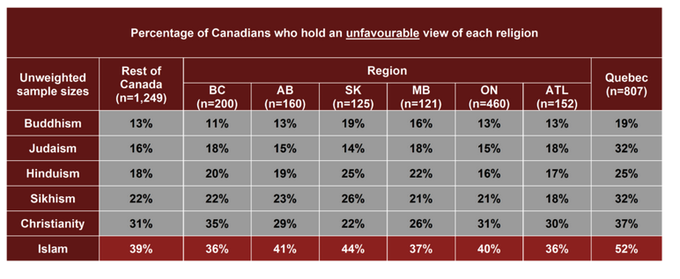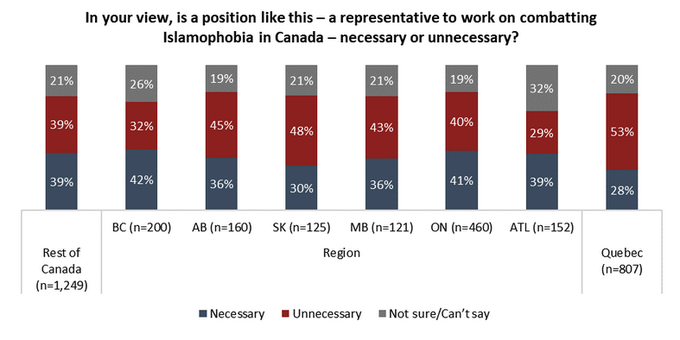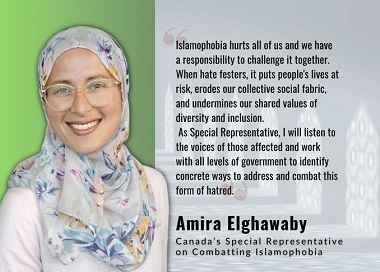
Special Representative on Combatting Islamophobia Amira Elghawaby made a joint statement (with Minister Ahmed Hussen) on the International Day to Combat Islamophobia, March 15.
Islamophobia is a major problem in Canada. Or is it? Depends who you ask.
A March 13 study by the Angus Reid Institute is titled ‘Islamophobia in Canada: Four mindsets indicate negativity is nationwide, most intense in Quebec.’
British Columbians come out just slightly less negative than the average in English Canada, with 36 compared to 39 percent holding an unfavourable view of Islam. (Disconcertingly, just about the same percentage in BC view Christians that way.)
The study does not not address the issue of how Christians feel about Muslims, but strong anecdotal evidence – not from the study, just from looking around town – shows that churches and ministries have led the way in welcoming Muslims to their communities.
Following is a brief look at the Angus Reid report, then some thoughts on how the Christian community is responding to Muslims.
Angus Reid study
 The Angus Reid report opens with these words:
The Angus Reid report opens with these words:
A new study from the non-profit Angus Reid Institute finds unfavourable views of Islam prevalent across the country at varying levels and highest in Quebec.
Indeed, two-in-five Canadians outside of Quebec (39 percent) hold an unfavourable view of Islam. In Quebec that number reaches half (52 percent).
These views take more concrete forms, however, than just the overall sentiment that the religion receives. Its followers face the risk of being unwelcome in a number of areas of Canadian society. . . .
Respondents were asked six questions about five religions – Islam, Christianity, Sikhism, Hinduism and Judaism. . . .
The report asked, ‘Does Canada have an anti-Muslim issue?’:
Much of the debate since the appointment of Amira Elghawaby as special representative on combatting Islamophobia has centered on whether this is truly a problem in Canada.
In 2017, the House of Commons passed a non-binding motion to condemn Islamophobia and other religious discrimination. Nearly all NDP and Liberal MPs voted for the motion while most Conservatives – including current leader Pierre Poilievre – voted against it.
Opinions on this issue are divided in near exact proportions. Half of Canadians say that Canada has a serious anti-Muslim problem to reckon with and half say it doesn’t. Notably, those with the most negative views towards Muslims in Canada are by far the most likely to say that this is not an issue.
British Columbia
Veteran Vancouver Sun columnist Douglas Todd (an expert on religion, but increasingly also on a range of housing, immigration and other issues) tweeted helpful comments about a couple of the key findings for the local scene:
British Columbians are equally negative about Islam & Christianity, says @angusreidorg 36% hold an unfavourable view of Islam, and 35% feel the same way about Christianity. This is different from rest of country. Buddhism is most ‘popular’ in B.C.
2/ “Nowhere in the country do a majority of Canadians feel that Canada needs an anti-Islamophobia ambassador,” says @angusreidorg. Since other faiths are also viewed unfavourably, esp. in B.C., should there be more such positions?
Go here for the full Angus Reid report, which covers a number of issues not mentioned here.
Welcome to Canada
While I am sure that Christians can be found right across the range of responses in the Angus Reid poll – and that many would have a more nuanced reaction to the impact of Islam in our culture than is reflected in the study – many churches and ministries have been working hard to welcome Muslims into our communities for decades.
Here are a few examples:
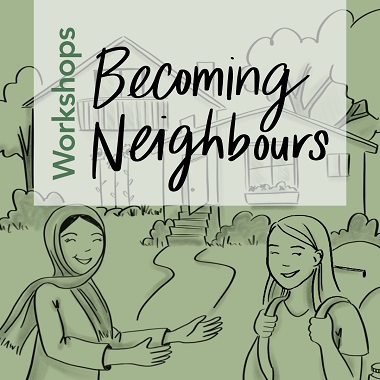 Church-sponsored refugees. Many churches have taken in refugees from Syria, Iraq, Iran . . . from many Muslim-majority nations. Go to Tenth Church’s Refugee Support page as one example. Ministries such as New Hope Community Services, MCC/BC and House of Omeed, are housing and helping newcomers, immigrants and refugees.
Church-sponsored refugees. Many churches have taken in refugees from Syria, Iraq, Iran . . . from many Muslim-majority nations. Go to Tenth Church’s Refugee Support page as one example. Ministries such as New Hope Community Services, MCC/BC and House of Omeed, are housing and helping newcomers, immigrants and refugees.- Welcoming asylum seekers: Groups such as Journey Home and Kinbrace (which grew out of Willingdon Church and Grandview Church respectively) are leaders in welcoming asylum seekers (refugee claimants) to Metro Vancouver. Check out the accompanying Around Town article to learn about Kinbrace’s Becoming Neighbours Workshops, beginning March 25. Inasmuch does similar work in Abbotsford.
- First Vancouver Christian Reformed Church (with other CRC churches) has worked hand-in-hand with the Immigrant Services Society of BC since well before it completed its Welcome Centre right next door to the church in 2016. Go here to read more.
- Mark Glanville, a scholar at Regent College, is co-author of the widely appreciated Refuge Reimagined: Biblical Kinship in Global Politics (IVP Academic, 2021). See his comment, also posted this week: ‘A biblical ethic of kinship for people on the move.’
- Christian Legal Fellowship: Similar work is going on all across the nation. A March 14 report in The McGill Tribune pointed to the active participation of the Christian Legal Fellowship in an interfaith Montreal conference: ‘Law & Faith: Bill 21 and Religious Discrimination in Quebec.’ (Bill 21 prohibits public servants in Quebec from wearing religious symbols). The CLF has been active in court appeals against the bill.
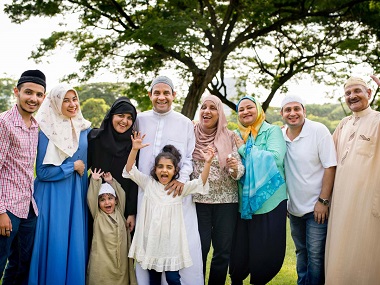
Loving Muslims Together is urging Christians to pray for and engage with Muslims during Ramadan.
One group, Loving Muslims Together, is suggesting ways to pray for and engage with our Muslim neighbours during Ramadan, which runs from March 22 to April 20.
Following are six ways to engage with Muslims:
- Share with your church about the opportunity we all have as Christians to pray for Muslims during Ramadan and invite your church to love Muslims in their community by praying for them.
- Wish Your Muslim Friends a Happy Ramadan, or ‘Ramadan Mubarak‘ in Arabic – a greeting used across the Muslim world.
- Peace Feasts bring Muslims and Christians together to share a meal and real faith conversations. For more information go to: https://www.peacefeast.net
- Look for the opportunity to share an iftar meal at a local mosque in your community. Muslims break their daily fast at the time of the call to prayer for the evening prayer and share a meal at sunset. I encourage you to contact a local mosque and ask if they welcome guests to share an iftar meal with them. If they do, put together a group from your church and take them along.
- Another way of engaging with Muslims during Ramadan is by connecting with the leader of the local mosque in your community. Check out Crescent Project’s initiative ‘Every Imam.’
- The Blessing Kit, by Crescent Project: A practical, simple way to love your Muslim neighbour at Ramadan by putting together a kit with meaningful items to your Muslim friend. For more information go to: Blessing Kits.
This initiative was featured in Faith Today, the national magazine of the Evangelical Fellowship of Canada. Go here for the full comment.
Islamophobia in context
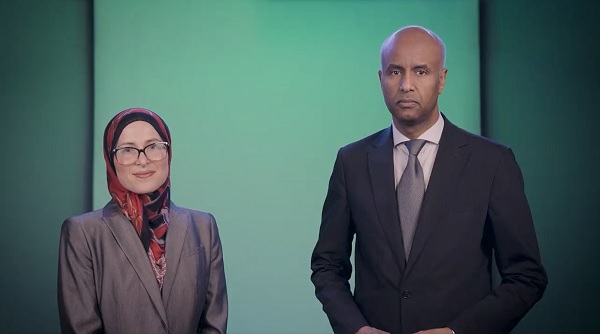
Click on the image to listen to the joint statement by Ahmed Hussen and Amira Elghawaby on the International Day to Combat Islamophobia.
Christians in our nation are Canadian – but we are also, more importantly, part of God’s international family. And the truth is that tens of millions of our brothers and sisters are being persecuted, or at least not allowed the freedoms that Muslims in Canada enjoy.
Liberal Minister of Housing and Diversity and Inclusion Ahmed Hussen and Special Representative on Combatting Islamophobia Amira Elghawaby made a joint statement on the International Day to Combat Islamophobia, March 15. It began:
Today, on the International Day to Combat Islamophobia, we stand in solidarity with Muslim communities across Canada and around the world. We reaffirm our commitment to take action to denounce and tackle Islamophobia, hate-fuelled violence and systemic discrimination whenever and wherever it occurs.
While most Christians will applaud this initiative, many will also wonder how they can make this statement about the international situation without taking note of persistent persecution of Christians (and other religious groups, including moderate Muslims) in so many Muslim-dominated nations.

Fourteen MPs attended Open Doors’ World Watch List presentation March 8.
Open Doors bases its work on the fact that “more than 360 million Christians fact high levels of persecution and discrimination for their faith in Jesus.” Their World Watch List 2023 points to “the 50 most dangerous countries in which to live as a Christian.”
More than half of that list are Muslim-majority nations and several more have large Muslim populations: “Many Sub-Saharan African nations are suffering from increased Islamic extremism and violence.”
Open Doors Canada had the opportunity to present the research undergirding the World Watch List on Parliament Hill earlier this month; 14 Members of Parliament attended, though not, apparently, either Hussen or Elghawaby.
Other groups are working alongside Open Doors to raise the profile of religious persecution. The World Evangelical Alliance (WEA), for example, is engaged on such issues at the United Nations in Bonn, Geneva and New York
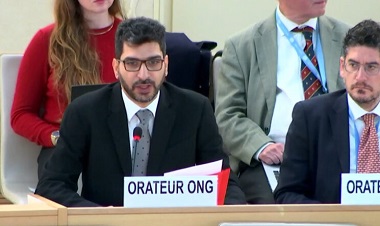
Wissam al-Saliby, Director of the WEA Geneva office, addressing the UN Human Rights Council March 13.
Over the past few years, WEA’s engagement at the UN has gained momentum, leading to the creation of the Global Advocacy Department, which stresses that “The WEA does not only advocate for Christians but for all who are persecuted for their faith.”
Christians should be ready to hear from the federal government, and even more from Muslims themselves, about the evils of Islamophobia in Canada, and around the world.
Many Christians have proven they are ready to welcome Muslims to Canada. But all Canadians deserve to have the issues presented in context – and that might just convince more of us to support the government’s approach to Islamophobia.

